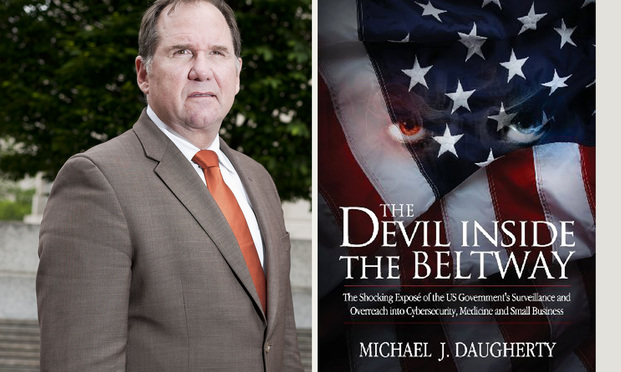Businessman Who Won 8-Year Fight With FTC Now Battling His Insurers Over Secret Settlement
The fight involves an attempt to block a $750,000 settlement in a defamation case.
February 13, 2020 at 07:12 PM
4 minute read
 Michael Daugherty writer of the book" The Devil Inside the Beltway."
Michael Daugherty writer of the book" The Devil Inside the Beltway."
An Atlanta businessman whose cancer detection laboratory was driven into the ground during an eight-year battle with the federal government has asked a judge to stop his insurers from settling a defamation case brought by the man behind the FTC probe.
Michael Daugherty and his defunct company, LabMD, are seeking an emergency temporary restraining order to stop his insurer, Sentinel Insurance Co. and its parent, The Hartford, from paying $750,000 to Robert Boback in what Daugherty claims is an illegal attempt to settle without his consent a 2013 lawsuit arising from Daugherty's self-published book, "The Devil Inside the Beltway."
The book is Daugherty's personal account of his battle with the U.S. Federal Trade Commission over a 2008 data breach at LabMD, and Boback's role in the federal investigation. Boback's now defunct cybersecurity firm, Tiversa, gained access to LabMD medical files and then sought to use those vulnerabilities and the resulting FTC investigation as leverage to market its cyber-protection services, according to court documents detailing the legal fight.
The emergency TRO request, filed Feb. 11 in U.S. District Court of the Northern District of Georgia, claims that Hartford "refused to adequately investigate" Boback's "sham lawsuit" or review the extensive public court and congressional records Daugherty said prove that Boback's defamation claims are bogus.
The case has been assigned to U.S. District Judge J.P. Boulee of the Northern District of Georgia.
The motion also contends that Hartford also refused to adequately pay for Daugherty's defense, pay his lawyers prevailing hourly rates, or pay for their investigators. Instead, Hartford opened "secret negotiations" with Boback's counsel, despite correspondence from Daugherty lawyers that "even reaching out to Boback about settlement … would prejudice the litigation," the TRO pleadings said.
"No case or public policy stands for the unsustainable position that settlement of retaliatory sham claims designed to injure the defendants and chill their First Amendment free speech right is in the interests of public policy or, frankly, of anyone," the pleadings said. "If this settlement is finalized, the immediate and irreparable damage to LabMD and Daugherty cannot be undone."
Calling Hartford's actions "a textbook case of bad faith," Daugherty's counsel also claimed in court pleadings that the insurance company is prohibited from subordinating Daugherty's interests to its own. "No reasonable insurer would settle … a suit brought by a man whose reputation has been publicly decimated" the motion said, "particularly where the statements that he alleges are defamatory have been validated as true."
Boback filed the defamation action that prompted the settlement in U.S. District Court in the Western District of Pennsylvania in 2013. He later refiled the suit in the Court of Common Pleas in Allegheny County after his attempts to stop publication of Daugherty's book failed, according to the pleadings.
Sentinel's counsel, Frank Ing-Jye Chao at Wilson Elser couldn't be reached for comment. A Hartford spokesperson also couldn't be reached.
Boback's attorney, Robert Ridge of Pennsylvania firm Clark Hill, couldn't be reached for comment. Boback is not named a party in the TRO action.
Daugherty's attorney, Holly Anne Pierson of Atlanta's Pierson Law, also couldn't be reached.
The TRO contends that if Hartford's "breakneck settlement effort" succeeds, it will preclude Daugherty from ever clearing his name.
"Throughout the litigation, LabMD and Daugherty and their counsel told Hartford that, because this was a defamation case, the only way to mitigate the damage to their reputations and their First Amendment rights was to obtain a favorable verdict or a settlement that obtained an admission by Boback … that the lawsuit was baseless," the pleadings said. "Without a judgment to confirm that no defamation took place, the stain of public defamation accusations could not be removed."
This content has been archived. It is available through our partners, LexisNexis® and Bloomberg Law.
To view this content, please continue to their sites.
Not a Lexis Subscriber?
Subscribe Now
Not a Bloomberg Law Subscriber?
Subscribe Now
NOT FOR REPRINT
© 2025 ALM Global, LLC, All Rights Reserved. Request academic re-use from www.copyright.com. All other uses, submit a request to [email protected]. For more information visit Asset & Logo Licensing.
You Might Like
View All
Law Firms Expand Scope of Immigration Expertise Amid Blitz of Trump Orders
6 minute read
Bass Berry & Sims Relocates to Nashville Office Designed to Encourage Collaboration, Inclusion
4 minute read
Gunderson Dettmer Opens Atlanta Office With 3 Partners From Morris Manning
3 minute read
Law Firms Mentioned
Trending Stories
- 1The Law Firm Disrupted: Scrutinizing the Elephant More Than the Mouse
- 2Inherent Diminished Value Damages Unavailable to 3rd-Party Claimants, Court Says
- 3Pa. Defense Firm Sued by Client Over Ex-Eagles Player's $43.5M Med Mal Win
- 4Losses Mount at Morris Manning, but Departing Ex-Chair Stays Bullish About His Old Firm's Future
- 5Zoom Faces Intellectual Property Suit Over AI-Based Augmented Video Conferencing
Who Got The Work
J. Brugh Lower of Gibbons has entered an appearance for industrial equipment supplier Devco Corporation in a pending trademark infringement lawsuit. The suit, accusing the defendant of selling knock-off Graco products, was filed Dec. 18 in New Jersey District Court by Rivkin Radler on behalf of Graco Inc. and Graco Minnesota. The case, assigned to U.S. District Judge Zahid N. Quraishi, is 3:24-cv-11294, Graco Inc. et al v. Devco Corporation.
Who Got The Work
Rebecca Maller-Stein and Kent A. Yalowitz of Arnold & Porter Kaye Scholer have entered their appearances for Hanaco Venture Capital and its executives, Lior Prosor and David Frankel, in a pending securities lawsuit. The action, filed on Dec. 24 in New York Southern District Court by Zell, Aron & Co. on behalf of Goldeneye Advisors, accuses the defendants of negligently and fraudulently managing the plaintiff's $1 million investment. The case, assigned to U.S. District Judge Vernon S. Broderick, is 1:24-cv-09918, Goldeneye Advisors, LLC v. Hanaco Venture Capital, Ltd. et al.
Who Got The Work
Attorneys from A&O Shearman has stepped in as defense counsel for Toronto-Dominion Bank and other defendants in a pending securities class action. The suit, filed Dec. 11 in New York Southern District Court by Bleichmar Fonti & Auld, accuses the defendants of concealing the bank's 'pervasive' deficiencies in regards to its compliance with the Bank Secrecy Act and the quality of its anti-money laundering controls. The case, assigned to U.S. District Judge Arun Subramanian, is 1:24-cv-09445, Gonzalez v. The Toronto-Dominion Bank et al.
Who Got The Work
Crown Castle International, a Pennsylvania company providing shared communications infrastructure, has turned to Luke D. Wolf of Gordon Rees Scully Mansukhani to fend off a pending breach-of-contract lawsuit. The court action, filed Nov. 25 in Michigan Eastern District Court by Hooper Hathaway PC on behalf of The Town Residences LLC, accuses Crown Castle of failing to transfer approximately $30,000 in utility payments from T-Mobile in breach of a roof-top lease and assignment agreement. The case, assigned to U.S. District Judge Susan K. Declercq, is 2:24-cv-13131, The Town Residences LLC v. T-Mobile US, Inc. et al.
Who Got The Work
Wilfred P. Coronato and Daniel M. Schwartz of McCarter & English have stepped in as defense counsel to Electrolux Home Products Inc. in a pending product liability lawsuit. The court action, filed Nov. 26 in New York Eastern District Court by Poulos Lopiccolo PC and Nagel Rice LLP on behalf of David Stern, alleges that the defendant's refrigerators’ drawers and shelving repeatedly break and fall apart within months after purchase. The case, assigned to U.S. District Judge Joan M. Azrack, is 2:24-cv-08204, Stern v. Electrolux Home Products, Inc.
Featured Firms
Law Offices of Gary Martin Hays & Associates, P.C.
(470) 294-1674
Law Offices of Mark E. Salomone
(857) 444-6468
Smith & Hassler
(713) 739-1250






